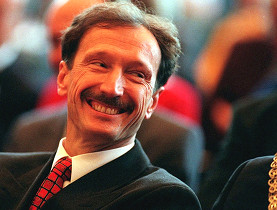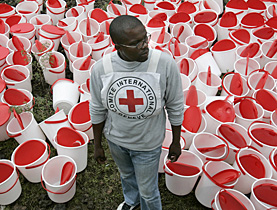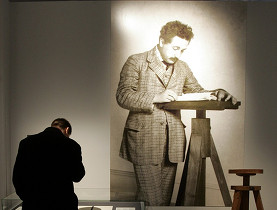Switzerland’s Nobel boom – bust?

When it comes to Nobel Prize winners per capita, Switzerland is head and shoulders above the competition – but on closer inspection all is not as it seems.
Since 1901, when the first prizes were awarded for physics, chemistry, physiology or medicine, literature and peace, 24 Swiss have been honoured – a fact not lost on politicians and business leaders.
And according to the Lausanne “talent incubator” IMD, Switzerland boasts 1.111 Nobel Prizes per million inhabitants, awarded between 1950 and 2001 for physics, chemistry, medicine and economics (the Sveriges Riksbank Prize in Economic Sciences, commonly identified with the Nobel Prize).
This “Nobel factor” compares with 0.840 for Britain, 0.713 for the United States, 0.341 for Germany and a mere 0.187 for France.
But what exactly is a “Swiss Nobel Prize winner”? Someone who lives and works in Switzerland or was merely born here? Or is it a question of Swiss citizenship?
What about those winners who own a Swiss passport but have never set foot in Switzerland? And then there are those top brains who settled in Switzerland not altogether voluntarily – often during times of war – and took Swiss citizenship (or maybe not).
Swiss Kofi Annan
Roland Müller, a historian of science, addresses this question on his website. He starts off by listing the 24 laureates who actually possessed Swiss citizenship when they were awarded their Nobel Prize.
A borderline case for Müller is the physicist Paul Dirac, who shared the 1933 Nobel Prize in Physics with Erwin Schrödinger. Born and bred in Britain, Dirac’s father was an immigrant from canton Valais so Paul also had Swiss citizenship.
Or Dirac’s Austrian-born colleague Wolfgang Pauli, who didn’t become a citizen of Zollikon in canton Zurich until after he had won his Nobel Prize in 1945.
Similarly Jack Steinberger, 1988 laureate for physics, had worked at the European Nuclear Research Organization (Cern) outside Geneva since 1968 but didn’t become a naturalised Swiss citizen until 2000.
Finally Kofi Annan, the Ghanaian former secretary-general of the United Nations, was awarded the Nobel Peace Prize in 2001 – the same year he received honorary citizenship of Geneva – and has been considered “Swiss” ever since.
Coincidence?
What’s more, between 1910 and 1981 nine further Nobel Peace Prizes went to organisations based in Switzerland.
Since then Nobels have also been awarded to 18 foreign scientists who either studied in Switzerland or who taught at universities in Zurich, Geneva or Basel. And 47 laureates cut their teeth at the many research institutes dotted around the country.
So in total more than a hundred Nobel winners have a close connection to Switzerland. Is this just a coincidence?
Yes, says Werner Arber, an Aargau-born microbiologist and geneticist who shared the 1978 Nobel Prize in Physiology or Medicine for the discovery of restriction endonucleases, which led to the development of recombinant DNA technology.
The cluster of prizes in Switzerland is “probably a statistical anomaly”, he told swissinfo.ch.
Good support
Richard Ernst, a chemist from Winterthur who was awarded the 1991 Nobel Prize in Chemistry for his work towards the development of Fourier Transform nuclear magnetic resonance spectroscopy, is not so sure.
He sees two reasons for the Nobel boom in Switzerland: first, the country sat on the fence during the two world wars and as a result attracted many of the best brains from across Europe.
Second, “the support and environment [in Switzerland] over the past 50 years has been extremely good. That doesn’t happen overnight – that’s the fruit of lengthy development”.
Ernst added that it’s got nothing to do with Switzerland being particularly intelligent. “Other countries such as Austria have equally good conditions from a human potential point of view,” he said.
However, he added that Austria was suffering from a “brain drain” with intelligence currently an export rather than an import.
“That’s less the case in Switzerland. On the contrary: the good financial conditions draw excellent researchers from around the world, most recently from the United States.”
No change
For this reason Ernst is confident that Switzerland will be able to hold its position at the top of the Nobel charts.
“The attraction for world-class people remains high – and I don’t see this changing,” he said.
Ernst admits however that a Nobel Prize is not the only sign of outstanding research.
“Many scientists go away empty-handed despite deserving the top accolade. Politics and a lot of luck often play a role.”
Consolation for all those researchers who haven’t – yet – been invited to Stockholm.
1901 Jean Henri Dunant: Nobel Peace Prize
1902 Elie Ducommun and Charles Albert Gobat: Nobel Peace Prize
1909 Emil Theodor Kocher: Physiology or Medicine
1913 Alfred Werner (born in Mulhouse, eastern France; citizen of Zurich from 1894): Chemistry
1919 Carl Friedrich Georg Spitteler: Literature
1920 Charles-Edouard Guillaume (lived in France from 1883): Physics
1921 Albert Einstein (born in Ulm, southern Germany; citizen of Zurich from 1901-1955): Physics
1937 Paul Karrer: Chemistry
1939 Leopold Ruzicka (born in Vukovar, now eastern Croatia; citizen of Zurich from 1917): Chemistry
1946 Hermann Hesse (born in Calw, southern Germany; citizenship of Basel from 1883-90 and from 1923 a citizen of Bern): Literature
1948 Paul Hermann Müller: Physiology or Medicine
1949 Walter Rudolf Hess: Physiology or Medicine
1950 Tadeus Reichstein (born in Wloclawek, Poland; citizen of Zurich from 1916): Physiology or Medicine
1951 Max Theiler (from 1922 in the US): Physiology or Medicine
1952 Felix Bloch (from 1934 in the US): Physics
1957 Daniel Bovet (from 1947 in Italy): Physiology or Medicine
1975 Vladimir Prelog (born in Sarajevo, Bosnia and Herzegovina; citizen of Zurich from 1959): Chemistry
1978 Werner Arber: Physiology or Medicine
1986 Heinrich Rohrer: Physics
1987 Karl Alexander Müller: Physics
1991 Richard Robert Ernst: Chemistry
1992 Edmond Henri Fischer (born in Shanghai, China; citizen of Geneva from 1947): Physiology or Medicine
1996 Rolf Zinkernagel: Physiology or Medicine
2002 Kurt Wüthrich: Chemistry
(Source: “muellerscience”)
(Translated from German by Thomas Stephens)

In compliance with the JTI standards
More: SWI swissinfo.ch certified by the Journalism Trust Initiative












You can find an overview of ongoing debates with our journalists here . Please join us!
If you want to start a conversation about a topic raised in this article or want to report factual errors, email us at english@swissinfo.ch.